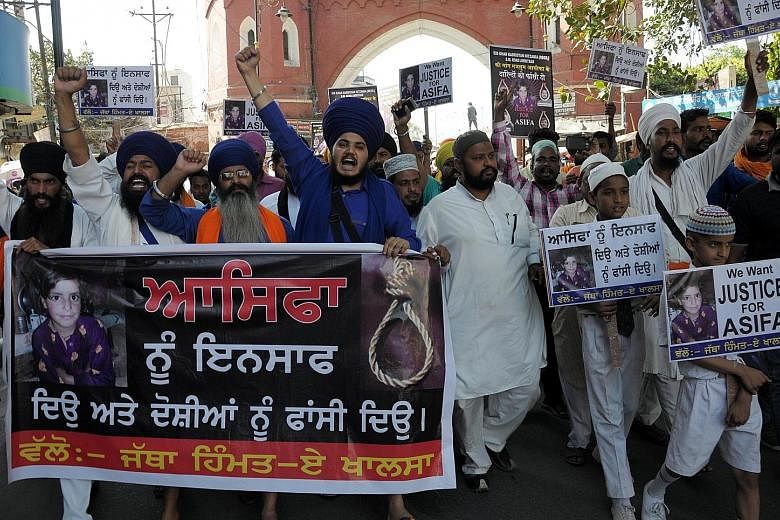India's Cabinet yesterday approved the death penalty for rapists of girls below the age of 12, after Prime Minister Narendra Modi held an emergency meeting in response to widespread outrage and protests over a series of cases.
The executive order amends the criminal law to also increase the punishment in other rape cases. For the rape of a girl below the age of 16, the minimum punishment will go up from 10 years to 20 years, while the penalty for the rape of women will be raised to 10 years from seven years.
The order will come into effect once it is signed by Indian President Ram Nath Kovind.
The death penalty already exists for repeat offenders, in cases where rape is fatal or leaves the victim in a vegetative state.
The move to amend rape laws for child-rape cases comes amid protests across the country against the brutal rape of an eight-year-old Muslim girl who had been held captive for days and drugged before being murdered earlier this month in the state of Jammu and Kashmir.
Amid the public outrage, two Jammu and Kashmir state ministers from Mr Modi's Bharatiya Janata Party (BJP) were sacked over a week ago after they attended rallies organised to defend the accused.
Eight people, including a local policeman, are being tried in court, with the case taking on communal overtones as the motive, according to the police, was to drive away the Muslim community from the predominantly Hindu village.
However, child rights activists, lawyers and victims' families said the introduction of the death penalty would make no difference because it would not bring about systemic changes in a justice system where victims lack protection and have to face years in court.
"It has been six years since my daughter passed away. What is the point of the death penalty when they (the four accused) have not yet been punished?" asked the father of a 23-year-old physiotherapy student whose rape in a moving bus had led to protests back in 2012.
The victim died two weeks after the rape in a Singapore hospital.
The case pushed the government to tighten rape laws, including bringing in the death penalty for rape cases for the first time in India. Five years later, the four men convicted of the crime are currently appealing the death sentence in the Supreme Court.
Sexual crimes against children have emerged as a real area of concern for India. According to the National Crime Records Bureau (NCRB), child rape has increased by 151 per cent in five years - from 5,484 in 2009 to 13,766 in 2014.
In 2016, the NCRB recorded 19,765 cases of child rape, with over 90 per cent of those accused being either family members or those known to the family.
The country remains a largely conservative society where there is a cultural preference for boys over girls. Female foeticide remains a problem, with girls considered a burden by families which have to dish out large marriage dowries.
The Economic Survey this year said the desire for a male child has resulted in 21 million "unwanted" girls in India up to the age of 25 years. All this along with low conviction rates, poor investigation in many cases and long delays in the legal process have contributed to India's rape problem, said activists.
In another case that has shaken up the country, a 17-year-old girl from Uttar Pradesh last year accused a powerful BJP legislator and several others of rape.
Her case came to public attention this month after she tried to burn herself in front of the chief minister's office over the police failure to initiate investigations.
"What we need is more accountability from the criminal justice system and fixing the gaps in investigations and prosecution," said Ms Swagata Raha, senior research assistant at the Centre for Child and the Law at the National Law School of India University.
"In the absence of victim protection programmes, timely compensation and support, most victims are navigating the criminal justice system entirely on their own.
"Those proposing it (the death penalty) need to consider that most perpetrators are known to the children and the pressure on the child to retract her statement will multiply when the punishment is likely to be death," she added.

